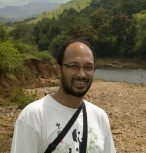DNA reveals the past and future of coral reefs
New DNA techniques are being used to understand how coral reacted to the end of the last ice age in order to better predict how they will cope with current changes to the climate. James Cook Univer

From 2005 to 2022, the main node of the ARC Centre of Excellence for Coral Reef Studies was headquartered at James Cook University in Townsville, Queensland (Australia)








Abstract: Describing diversity and its causes is a long-standing pursuit in ecology and evolutionary biology. Recent models have combined the effects of environment and species ranges to create null models of distribution, which can be compared with empirical patterns of diversity at large spatial scales, but these fail to take local scale diversification into account. Our knowledge of diversification, and diversity itself, remains incomplete for many taxonomic groups, due both to an incomplete knowledge of taxonomy and incomplete sampling. We used a grid based approach, incorporating principles of biogeography, to sample frogs, lizards and snakes across the Western Ghats range in peninsular India . Morphological and molecular data were then combined with fine scale geographical distribution data to delimit lineages in these groups. The method resulted in 200 to 300 % increases in lineages for several genera of frogs and lizards. Lineage diversification and evolutionary history can thus be included in models that seek to explain diversity patterns at large spatial scales.
Biography: Kartik is Associate Professor at the Centre for Ecological Sciences, Indian Institute of Science, Bangalore. He is primarily interested in the distribution of diversity at various levels of organisation, from genes to ecosystems, and at various spatial scales. He works on the community ecology and biogeography of various taxa, including marine invertebrates, fish, amphibians, reptiles and birds, in both terrestrial and marine systems. He also works on the biology and conservation of sea turtles including olive ridley turtles in Orissa, leatherback turtles in the Andaman and Nicobar Islands, and green turtles in the Lakshadweep Islands. He is a former President of the International Sea Turtle Society, Founding Editor of the Indian Ocean Turtle Newsletter and Current Conservation, and Editor of Conservation and Society. He is a Founding Trustee of Dakshin Foundation, which aims to inform and advocate conservation and natural resource management through inter-disciplinary research and action.
New DNA techniques are being used to understand how coral reacted to the end of the last ice age in order to better predict how they will cope with current changes to the climate. James Cook Univer
A new study on the effects of climate change in five tropical countries has found fisheries are in more trouble than agriculture, and poor people are in the most danger. Distinguished Profess
James Cook University researchers have found brightly coloured fish are becoming increasingly rare as coral declines, with the phenomenon likely to get worse in the future. Christopher Hemingson, a
Researchers working with stakeholders in the Great Barrier Reef region have come up with ideas on how groups responsible for looking after the reef can operate more effectively when the next bleaching
Abstract: As marine species adapt to climate change, their heat tolerance will likely be under strong selection. Individual variation in heat tolerance and its heritability underpin the potential fo
Abstract: The Reef Ecology Lab in KAUST’s Red Sea Research Center explores many aspects of movement ecology of marine organisms, ranging from adult migrations to intergenerational larval dispersal
Abstract: Macroalgal meadows are a prominent, yet often maligned component of the tropical seascape. Our work at Ningaloo reef in WA demonstrate that canopy forming macroalgae provide habitat for ad
Abstract: Sharks are generally perceived as strong and fearsome animals. With fossils dating back at least 420 million years, sharks are not only majestic top predators but they also outlived dinosa
Abstract: Connectivity plays a vital role in many ecosystems through its effects on fundamental ecological and evolutionary processes. Its consequences for populations and metapopulations have been
Abstract: Evolution of many eukaryotic organisms is affected by interactions with microbes. Microbial symbioses can ultimately reflect host’s diet, habitat range, and even body shape. However, how
Abstract: The past few years have seen unprecedented coral bleaching and mortality on the Great Barrier Reef (GBR) but the consequences of this on biodiversity are not yet known. This talk will expl